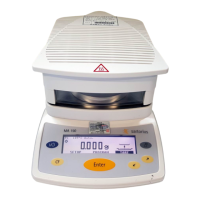The moisture analyzer comprises
a heater unit, weighing system and
operating unit. In addition to the socket
for AC power (mains supply), it also
has an interface port for connecting
peripheral devices (such as PC, printer,
etc.).
Storage and Shipping Conditions
Permissible storage temperature:
0 to +40°C
Do not unnecessarily expose the mois-
ture analyzer to extreme temperatures,
moisture, shocks or vibration.
Unpacking the Moisture Analyzer
§ After unpacking the moisture analyzer,
inspect the device immediately for
any visible damage that may have been
caused by rough handling during
shipment
$ If damage has occurred: Refer to
“Safety inspection” in the “Care and
maintenance” chapter.
Save the box and all other packaging
until you have successfully installed
your moisture analyzer. Only the original
packaging provides the best protection
for shipment. Before packing your
moisture analyzer, unplug all connected
cables to prevent damage.
5
Getting Started
Equipment Supplied
The equipment supplied includes
the following:
– Moisture analyzer
– Power cord
– Pan support
– Pan
draft
shield
– Dust cover for keypad
– 80 disposable aluminum sample pans
– 1 pair of forceps
Installation Instructions
The moisture analyzer has been designed
to provide reliable results under normal
ambient conditions in the laboratory
and in industrial use. When choosing
a
location
to
set
up
your
moisture
ana-
lyzer, observe the following to work
with speed and accuracy:
– Set up the moisture analyzer on a stable,
even surface that is not exposed to
vibration and level the device using the
four leveling feet
– Avoid placing the analyzer in close
proximity to a heater or exposing it to
direct sunlight
– Avoid exposing the moisture analyzer to
extreme
temperature
fluctuations
– Protect
the
moisture
analyzer
from
drafts
(open windows or doors)
– Provide the moisture analyzer with as
much protection from dust as possible
– Protect the moisture analyzer from
aggressive chemical vapors
– Do not expose the analyzer to extreme
moisture
– Ensure
the
analyzer
is
located
in
a
place
where
excessive
heat
cannot
build up. Leave enough space
between the moisture analyzer and
materials
that
are
affected
by
heat.
Conditioning the Moisture Analyzer
Moisture in the air can condense on
the surfaces of a cold moisture analyzer
whenever it is brought into a substan-
tially warmer place. On transfering
the moisture analyzer to a warmer area,
make sure to condition it for about
2 hours at room temperature (un-
plugged from power). Afterwards, if you
keep the moisture analyzer connected
to
AC
power,
the
continuous
positive
difference
in
temperature
between
the
inside of the moisture analyzer and the
outside will practically rule out the
effects of moisture condensation.
Setting up the Moisture Analyzer
§ Attach components in this order:
– Dust cover over keypad
– Pan
draft
shield
– Pan support; turn carefully to left
or right, press gently until it stops and
snaps into place
– Disposable sample pan

